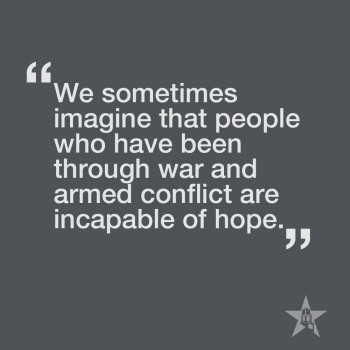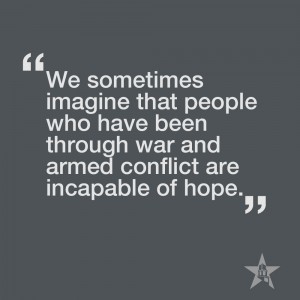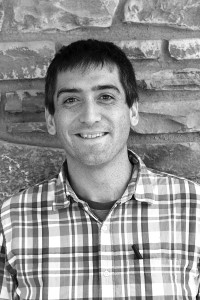Micah Cronin ’17 approached the front of the recital hall stage prepared with a tongue-in-cheek self-introduction: “Many of you know me as Mary Cronin, and so you might be a little bit confused right now. It’s okay; I have not been replaced by my evil twin.”
On April 5, Cronin and Dean of the Chapel, Michael Jordan, hosted a forum entitled “Baptized into One Body: LBGTQ-Affirming Christians at Houghton College,” which aimed to spark dialogue and compassionate listening on LBGTQ, specifically transgender issues. For the first half of the forum, Cronin shared personal thoughts, convictions, and experiences with members of the college community. The evening then moved to a question and answer session where Jordan and Cronin interviewed each other using anonymous audience-submitted questions.
Cronin was raised female, but identifies as male, choosing to go by Micah and use male pronouns. Jordan chose to honor this decision despite disagreeing with it.
“I’ve agreed to call Micah by his chosen name tonight, rather than by Mary, and to use masculine pronouns when talking about him,” said Jordan. “My reasons for this are at once rather complex and at the same time very simple, because he asked me to.” Jordan explained he felt “to insist on calling Micah ‘Mary’ tonight would be like taking all my interactions with Micah and using every one of those to remind him that I disagree with him, and that’s a really hard way to build a relationship with someone.”
Cronin, who believes that the church should embrace LGBTQ-affirming Christians, cited a Pew Research Center report which found an increasing number of LBGTQ people are joining the church even as church membership decreases in the overall American population. Cronin expressed frustration with “rhetoric regarding how ‘the church’ should respond to the LBGTQ community,” insisting that this fails to grapple with the reality of the situation.
“Queer people are the church,” said Cronin. “I’ll say it again, queer people are the church.”
Cronin addressed ways in which traditional Christians can, intentionally or unintentionally, marginalize people who fall outside the heterosexual and cisgender circle. Cronin focused on a refusal to acknowledge both the complexity of the LBGTQ community and the complexity of the human beings within that community. According to Cronin, traditionalists who use outdated or inaccurately-narrow labels like “homosexual” or “same-sex attracted” to refer to the LBGTQ community send an implicitly demeaning message: “Our complexity does not matter. Our personhood does not matter. We do not matter.”
Likewise, said Cronin, reducing LBGTQ people to their sexual behavior fails to acknowledge them as human beings, “The conversation around queer people is so saturated with discussion of sex acts that it has long since passed the point of objectification.”
Colleen Shannon ’17, who attended the forum, said she appreciated “the respectful discussion, but also the direct conversation.” She said it is possible to err too far on the side of respect, to the point of ignoring an issue entirely.
Referencing an anonymous question which had referenced Cronin’s “trans-ness” (which
had prompted a joke from Cronin about the “Trans-Ness Monster”), Shannon commented on the importance of demystifying nontraditional perspectives on sexuality and gender. She said, “It’s not some mythical creature up in Scotland; this is a reality in culture, in American culture and in Christian culture and in world culture.”
Jordan said, “I think part of the message of Jesus is that we understand things about God better in relationship with other people.” Jordan said he hoped the forum and discussions like it would give students practical, relational experience that would prepare them for future interactions with people who hold differing beliefs on sexuality.
Cronin counseled traditionalists and progressives to “remember that first and foremost, anybody who has been baptized in the name of Christ and trusts in Jesus’ life, death, and resurrection as their hope and their salvation is a part of Christ’s body.” She continued, “ That extends to LBGTQ people, that extends to conservative people, that extends to anybody who we find inconvenient. And if we remember that, then we will actually be able to be brothers and sisters in Christ.”




 This reality makes me especially excited for this year’s Faith and Justice Symposium, with the theme “Stories of Hope.” We sometimes imagine that people who have been through war and armed conflict are incapable of hope. Places like Somalia, the Ukraine, Iraq, the Sudan (and other nations like Rwanda and Ethiopia before them) become bywords, shortcuts we use to approximate otherwise unimaginable suffering. “There can be no hope there,” we say, “unless those of us who follow Jesus bring hope to the hopeless,” and in so saying we honor not Jesus but ourselves.
This reality makes me especially excited for this year’s Faith and Justice Symposium, with the theme “Stories of Hope.” We sometimes imagine that people who have been through war and armed conflict are incapable of hope. Places like Somalia, the Ukraine, Iraq, the Sudan (and other nations like Rwanda and Ethiopia before them) become bywords, shortcuts we use to approximate otherwise unimaginable suffering. “There can be no hope there,” we say, “unless those of us who follow Jesus bring hope to the hopeless,” and in so saying we honor not Jesus but ourselves.